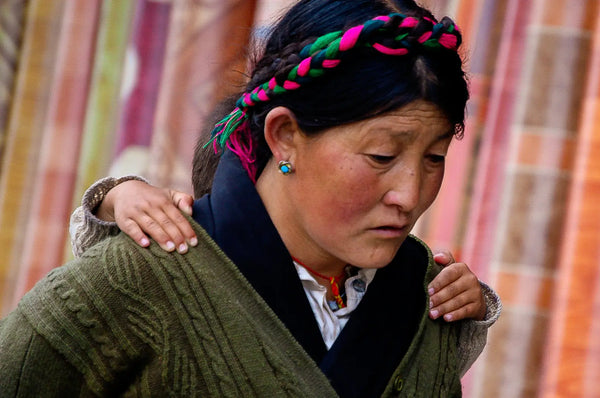སྡུག་བསྔལ་སྤྱི་མཆན་བྱང་: Loving Trust in Lhasa
Tax included
Shipping calculated at checkout
100 in stock
Pickup currently unavailable
In bustling Lhasa, Tibet, a determined Tibetan mother makes her way to the temple, adorned in traditional attire: an intricately woven headband and vibrant turquoise earrings complement her tanned, weathered skin and rosy cheeks, testament to the region's harsh sun. Her lovely face, deep in thought, gazes downward as she walks briskly. A heartwarming detail reveals her child nestled discreetly on her back, tiny hands holding onto her shoulders with affection.
In Tibetan culture, women are esteemed for their honesty and authenticity, valuing qualities such as kindness, courage, and sincerity over wealth or power. A lesser-known tradition in Tibet is that of polyandry, where women historically married sets of brothers, often taking on multiple husbands—sometimes two, and occasionally four or more. This practice is normal and widely accepted within Tibetan society, reflecting cultural and historical norms where managing family responsibilities and land ownership play significant roles.
This photograph not only captures the resilience and grace of Tibetan motherhood but also serves as a poignant reminder of the deep-rooted traditions and values that shape Tibetan society. It offers viewers a glimpse into the everyday life and cultural richness of Tibet, inviting them to appreciate the beauty and strength found in the rituals and traditions of Tibetan women. Tibetan women's roles often include managing family finances and owning property, providing them with both sexual and economic freedoms that are traditionally absent in many so-called “developed” societies elsewhere.
Collapsible tab
Collapsible tab
Image block
Use these image blocks to tell your story, promote your products or create a beautiful gallery.
Text block
Use these text blocks to promote seasonal sales, store events or to tell your brand's story.
Text block
Use these text blocks to promote seasonal sales, store events or to tell your brand's story.
Image block
Use these image blocks to tell your story, promote your products or create a beautiful gallery.
Testimonials
Use these testimonials to share what customers are saying about your products and your brand.
Customer name
Source
Use these testimonials to share what customers are saying about your products and your brand.
Customer name
Source
Use these testimonials to share what customers are saying about your products and your brand.
Customer name
Source
Image with text
Use these blocks to share your brand's story. You can focus on a particular collection, a product detail, or even embed a video.
Image with text
Use these blocks to share your brand's story. You can focus on a particular collection, a product detail, or even embed a video.


